Historique des versions de Debian
Les sorties Debian ne suivent pas un calendrier fixe. Les dernières versions ont été sorties à peu près tous les deux ans par le Projet Debian.

Historique des sorties
Debian 1.0 n'a jamais été publié car un vendeur a accidentellement livré une version de développement avec ce numéro de version. Le système de gestion de paquet dpkg et son front-end dselect ont été développés et mis en œuvre sur Debian dans une version précédente. Une transition du format binaire a.out vers ELF avait déjà commencé avant la version 1.0. La seule architecture prise en charge était le 80386 d'Intel (i386)[1].
Debian 1.1 (Buzz)
Debian 1.1 (Buzz), sorti le , contenait 474 paquets. Debian a terminé sa transition vers format binaire ELF et utilisait le noyau Linux 2.0[2].
Debian 1.2 (Rex)
Debian 1.2 (Rex), sorti le , contenait 848 paquets maintenus par 120 développeurs[3].
Debian 1.3 (Bo)
Debian 1.3 (Bo), sorti le , contenait 974 paquets maintenus par 200 développeurs[4].
Debian 2.0 (Hamm)
Debian 2.0 (Hamm), sorti le , contenait plus de 1 500 paquets maintenus par plus de 400 développeurs. Une transition a été faite vers libc6 et Debian a été porté sur les architectures Motorola 68000 (m68k)[5].
Debian 2.1 (Slink)
Debian 2.1 (Slink), publié le , contenait environ 2250 paquets. Le front-end APT a été introduit en tant que système de gestion des paquets et Debian a été porté sur architectures Alpha et SPARC[6],[7].
Debian 2.2 (Potato)
Debian 2.2 (Potato), sorti le 14 et , contenait 2 600 paquets maintenus par plus de 450 développeurs. Les nouveaux paquets inclus le gestionnaire d'affichage GDM, le service d'annuaire OpenLDAP, le logiciel de sécurité OpenSSH et l'agent de transfert de mail (MTA) Postfix. Debian a été porté vers les architectures PowerPC et BRAS[8],[9],[10].
Debian 3.0 (Woody)
Debian 3.0 (Woody), sorti le , contenait environ 8500 paquets maintenus par plus de 900 développeurs. KDE a été introduit et Debian a été porté vers les architectures suivantes : IA-64, PA-RISC (hppa), mips et mipsel et IBM ESA/390 (s390)[11],[12],[13].
Debian 3.1 (Sarge)
Debian 3.1 (Sarge), sorti le , contenait l'équivalent de 15 400 paquets. debian-installer et OpenOffice.org ont été introduits[14],[15].
Debian 4.0 (Etch)
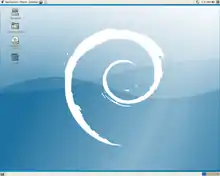
Debian 4.0 (Etch), sorti le , contenait environ 18 000 paquets maintenus par plus de 1 030 développeurs. Debian a été porté sur architecture x86-64 (amd64) et le support pour les architectures Motorola 68000 (m68k) a été abandonné[16],[17].
Debian 5.0 (Lenny)

Debian 5.0 (Lenny), sorti le , contenait plus de 23 000 paquets. Debian a été porté sur architecture ARM EABI ("armel")[18],[19],[20].
Debian 6.0 (Squeeze)
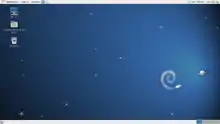
Debian 6.0 (Squeeze), publié le , contenait plus de 29 000 paquets. Le navigateur web Chromium a été introduit et Debian a été porté sur les noyaux kfreebsd-i386 et kfreebsd-amd64 et le support pour les architectures Alpha, et PA-RISC (hppa) a été abandonné[21],[22],[23].
Debian 7 (Wheezy)
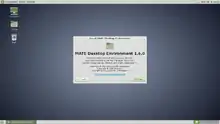
Debian 7 (Wheezy), publié le , contenait plus de 36 000 paquets. Le support de l'UEFI a été ajouté et Debian a été porté sur les architectures armhf et IBM ESA/390 (s390x)[24],[25],[26].
Debian 8 (Jessie)

Debian 8 (Jessie), sorti le 25 et , contenait plus de 43 000 paquets, avec systemd installé par défaut au lieu de init. (Les paquets sysvinit et upstart sont fournis à titre de solutions de rechange). Debian a été porté sur architectures ARM64 et ppc64le , alors que le support pour les IA-64, kfreebsd-amd64 et kfreebsd-i386, IBM ESA/390 (s390) (seulement les variantes 32 bits ; la nouvelle variante 64 bits du s390x est conservé) et SPARC ont été abandonnées[27],[28],[29].
Debian 9 (Stretch)
Debian 9 (Stretch), sorti le , contenait plus de 51 000 paquets, elle comprend de nombreuses montées en version notamment le noyau Linux en version 4.9, systemd 232, apt 1.4, GCC 6.3.0, PHP 7.0, Python 2.7.13 et 3.5.3, Apache 2.4.25, Nginx 1.10.3. MariaDB remplace par défaut désormais MySQL. Debian a été porté sur architecture MIPS 64 bit little endian (il existait déjà sur d'autres sortes de MIPS) et n'est plus supporté pour PowerPC 32-bits (mais continue d'exister en PowerPC 64 bits)[30]
Debian 10 (Buster)
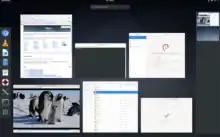
Debian 10 (Buster) est sorti le , contient plus de 57 700 paquets. Dont, le noyau Linux en version 4.19, PHP 7.3, Python 3.7.3, Apache 2.4.38, Nginx 1.14…
Voici ci-dessous la liste des architectures officiellement prises en charge par Debian 10 :
- PC 32 bits (
i386) et PC 64 bits (amd64) - ARM 64 bits (
arm64) - ARM EABI (
armel) - ARMv7 (ARM avec unité de calcul flottant,
armhf) - MIPS (
mips(gros-boutiste — big endian en anglais) etmipsel(petit-boutiste — little endian en anglais)) - MIPS 64 bits petit-boutiste (
mips64el) - PowerPC 64 bits petit-boutiste (
ppc64el) - IBM System z (
s390x)
Debian 11 (Bullseye)

Debian 11 (Bullseye) est sorti le [31].
La phase de "freeze" ("gelée" pour test) avait débuté le .
Voici ci-dessous la liste des architectures officiellement prises en charge par Debian 11[32] :
- PC 32 bits (
i386) et PC 64 bits (amd64) - ARM 64 bits (
arm64) - ARM EABI (
armel) - ARMv7 (ARM avec unité de calcul flottant,
armhf) - MIPS
mipsel(petit-boutiste — little endian en anglais)) - MIPS 64 bits petit-boutiste (
mips64el) - PowerPC 64 bits petit-boutiste (
ppc64el) - IBM System z (
s390x)
Dates des sorties
Table des sorties
| Version | Nom de code | Date de sortie | Portages | Paquets | Mainteneurs | Noyau Linux | Fin du support de sécurité | Fin de LTS | Références | ||||||
|---|---|---|---|---|---|---|---|---|---|---|---|---|---|---|---|
| 0.90 | NC | août- | NC | NC | NC | NC | NC | None | [1] | ||||||
| 0.91 | NC | NC | NC | NC | NC | NC | [1] | ||||||||
| 0.93R5 | NC | NC | NC | NC | NC | NC | [1] | ||||||||
| 0.93R6 | NC | NC | NC | NC | NC | NC | [1] | ||||||||
| 1.0 | jamais sortie | [1] | |||||||||||||
| 1.1 | Buzz | 1 | 474 | NC | 2.0 | NC | None | [1] | |||||||
| 1.2 | Rex | 848 | 120 | NC | NC | [1] | |||||||||
| 1.3 | Bo | 974 | 200 | 2.0.33 | NC | [1] | |||||||||
| 2.0 | Hamm | 2 | ≈ 1 500 | ≈ 400 | 2.0.34 | NC | [1] | ||||||||
| 2.1 | Slink | 4 | ≈ 2 250 | NC | 2.0.34, 2.0.35, 2.0.36, 2.0.38 | [1],[33],[34] | |||||||||
| 2.2 | Potato | 14– | 6 | ≈ 3 900 | ≈ 450 | 2.0.38, 2.2.19 | [1],[35],[36] | ||||||||
| 3.0 | Woody | 11 | ≈ 8 500 | ≈ 900 | 2.2.20, 2.4.6 | [1],[37],[38],[39] | |||||||||
| 3.1 | Sarge | ≈ 15 400 | NC | 2.4.27, 2.6.8 | [1],[40],[41] | ||||||||||
| 4.0 | Etch | ≈ 18 000 | ≈ 1 030 | 2.6.18 | [1],[42],[43] | ||||||||||
| 5.0 | Lenny | 12 | ≈ 23 000 | NC | 2.6.26 | [1],[44],[45] | |||||||||
| 6.0 | Squeeze | 11 | ≈ 29 000 | NC | 2.6.32 | [1],[46],[47],[48],[49] | |||||||||
| 7 | Wheezy | 13 | ≈ 36 000 | NC | 3.2 | [1],[50],[51],[52],[48] | |||||||||
| 8 | Jessie | 25– | 10 | ≈ 43 000 | NC | 3.16 | [1],[53],[54],[48] | ||||||||
| 9 | Stretch | 10 | ≈ 52 000 | NC | 4.9 | [1],[55],[56] | |||||||||
| 10 | Buster | 10 | ≈ 51 000 | NC | 4.19 | [57],[58] | |||||||||
| 11 | Bullseye | 9 | 57703 | À venir | 5.10 | À venir | [59],[32] | ||||||||
| 12 | Bookworm | À venir | À venir | À venir | À venir | À venir | À venir | À venir | [60] | ||||||
| 13 | Trixie | À venir | À venir | À venir | À venir | À venir | À venir | À venir | [61] | ||||||
| unstable | Sid | Jamais | 22
(13 officiels) |
> 62 000
(janv. 2019) |
NC | 5.10
(avril 2021) |
Jamais | Sans objet | |||||||
| |||||||||||||||
Chronologie graphique de Debian GNU/Linux
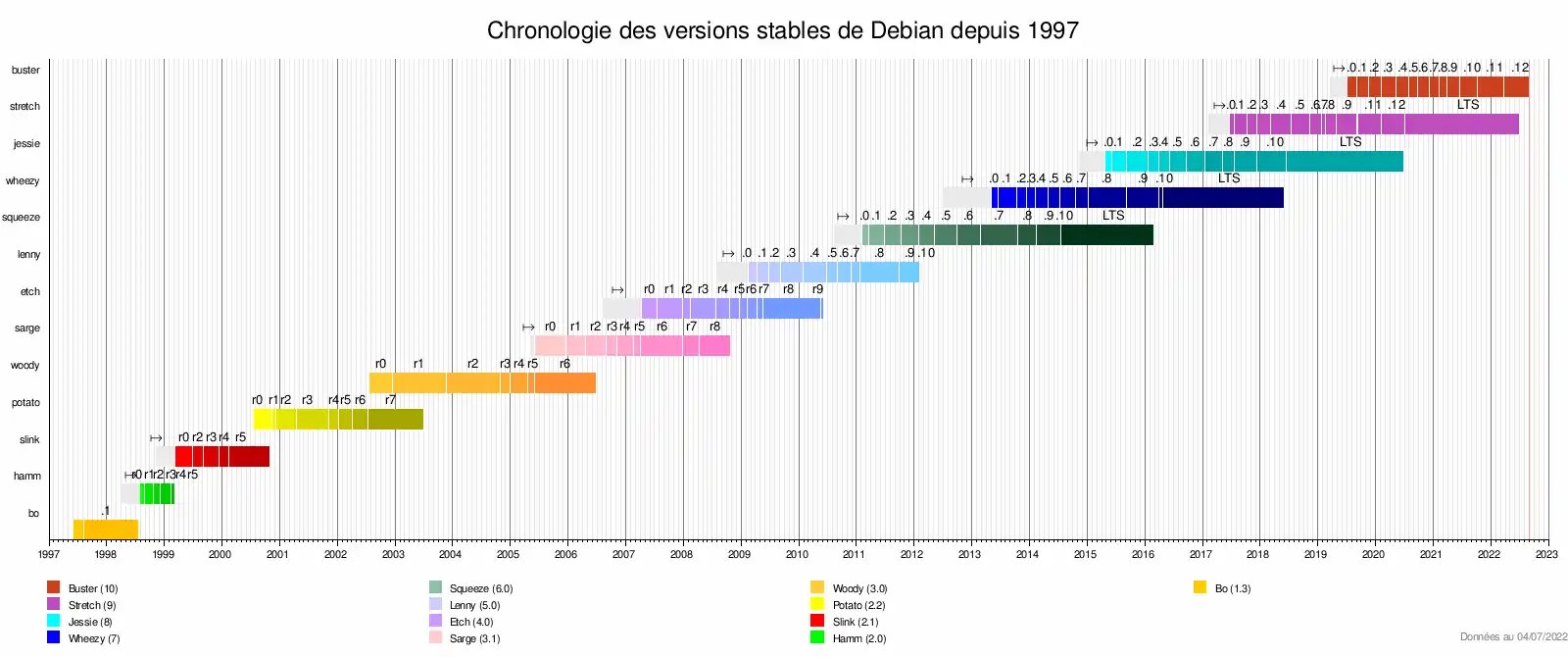
L’intégralité du calendrier des mises à jour du projet Debian est disponible ici [62]
| Description de la chronologie | |||||
|---|---|---|---|---|---|
| Version | Première | Date | Dernière | Jusqu'à | |
| Buzz | 1.1 | NC | NC | ||
| Rex | 1.2 | NC | NC | ||
| Bo | 1.3 | 1.3.1.r8 | |||
| Hamm | 2.0r0 | 2.0r5 | |||
| Slink | 2.1r0 | 2.1r5 | |||
| Potato | 2.2r0 | 14– | 2.2r7 | ||
| Woody | 3.0r0 | 3.0r6 | |||
| Sarge | 3.1r0 | 3.1r8 | |||
| Etch | 4.0r0 | 4.0r9 | |||
| Lenny | 5.0 | 5.0.10 | |||
| Squeeze | 6.0 | 6.0.10 | |||
| Wheezy | 7.0 | 7.11 | |||
| Jessie | 8.0 | 8.11 | |||
| Stretch | 9.0 | 9.13 | |||
| Buster | 10.0 | 10.9 | |||
| Bullseye | 11.0 | 11.0 | À venir | ||
Références
- (en) « A Brief History of Debian », The Debian Project (consulté le )
- « A Brief History of Debian », The Debian Project : « Debian 1.1 Buzz (June 17th, 1996): This was the first Debian release with a code name. It was taken, like all others so far, from a character in one of the Toy Story movies... in this case, Buzz Lightyear. By this time, Bruce Perens had taken over leadership of the Project from Ian Murdock, and Bruce was working at Pixar, the company that produced the movies. This release was fully ELF, used Linux kernel 2.0, and contained 474 packages. »
- « A Brief History of Debian », The Debian Project : « Debian 1.2 Rex (December 12th, 1996): Named for the plastic dinosaur in the Toy Story movies. This release consisted of 848 packages maintained by 120 developers »
- « A Brief History of Debian », The Debian Project : « Debian 1.3 Bo (June 5th, 1997): Named for Bo Peep, the shepherdess. This release consisted of 974 packages maintained by 200 developers. »
- « A Brief History of Debian », The Debian Project : « Debian 2.0 Hamm (July 24th, 1998): Named for the piggy-bank in the Toy Story movies. This was the first multi-architecture release of Debian, adding support for the Motorola 68000 series architectures. With Ian Jackson as Project Leader, this release made the transition to libc6, and consisted of over 1500 packages maintained by over 400 developers. »
- « A Brief History of Debian », The Debian Project : « Debian 2.1 Slink (March 9th, 1999): Named for the slinky-dog in the movie. Two more architectures were added, Alpha and SPARC. With Wichert Akkerman as Project Leader, this release consisted of about 2250 packages and required 2 CDs in the official set. The key technical innovation was the introduction of apt, a new package management interface. Widely emulated, apt addressed issues resulting from Debian's continuing growth, and established a new paradigm for package acquisition and installation on Open Source operating systems. »
- « Debian 2.1 (slink) Information », The Debian Project
- « A Brief History of Debian », The Debian Project : « Debian 2.2 Potato (15 August 2000): Named for "Mr Potato Head" in the Toy Story movies. This release added support for the PowerPC and ARM architectures. With Wichert still serving as Project Leader, this release consisted of more than 3900 binary packages derived from over 2600 source packages maintained by more than 450 Debian developers. »
- « Debian GNU/Linux 2.2 ('potato') Release Information », The Debian Project
- « Debian GNU/Linux 2.2, the "Joel 'Espy' Klecker" release, is officially released », The Debian Project
- « A Brief History of Debian », The Debian Project : « Debian 3.0 Woody (19 July 2002): Named for the main character the Toy Story movies: "Woody" the cowboy. Even more architectures were added in this release: IA-64, HP PA-RISC, MIPS (big endian), MIPS (little endian) and S/390. This is also the first release to include cryptographic software due to the restrictions for exportation being lightened in the US, and also the first one to include KDE, now that the license issues with QT were resolved. With Bdale Garbee recently appointed Project Leader, and more than 900 Debian developers, this release contained around 8,500 binary packages and 7 binary CDs in the official set. »
- « Debian GNU/Linux 3.0 “woody” Release Information », The Debian Project
- « Debian GNU/Linux 3.0 released », The Debian Project
- « A Brief History of Debian », The Debian Project : « Debian 3.1 Sarge (6 June 2005): named for the sergeant of the Green Plastic Army Men. No new architectures were added to the release, although an unofficial AMD64 port was published at the same time and distributed through the new Alioth project hosting site. This release features a new installer: debian-installer, a modular piece of software that feature automatic hardware detection, unattended installation features and was released fully translated to over thirty languages. It was also the first release to include a full office suite: OpenOffice.org. Branden Robinson had just been appointed as Project Leader. This release was made by more than nine hundred Debian developers, and contained around 15,400 binary packages and 14 binary CDs in the official set. »
- « Debian “sarge” Release Information », The Debian Project
- « A Brief History of Debian », The Debian Project : « Debian 4.0 Etch (8 April 2007): named for the sketch toy in the movie. One architecture was added in this release: AMD64, and official support for m68k was dropped. This release continued using the debian-installer, but featuring in this release a graphical installer, cryptographic verification of downloaded packages, more flexible partitioning (with support for encrypted partitions), simplified mail configuration, a more flexible desktop selection, simplified but improved localization and new modes, including a rescue mode. New installations would not need to reboot through the installation process as the previous two phases of installation were now integrated. This new installer provided support for scripts using composed characters and complex languages in its graphical version, increasing the number of available translations to over fifty. Sam Hocevar was appointed Project Leader the very same day, and the project included more than one thousand and thirty Debian developers. The release contained around 18,000 binary packages over 20 binary CDs (3 DVDs) in the official set. There were also two binary CDs available to install the system with alternate desktop environments different to the default one. »
- « Debian “etch” Release Information », The Debian Project
- « A Brief History of Debian », The Debian Project : « Debian 5.0 Lenny (February 2009): named for the wind up binoculars in the Toy Story movies. One architecture was added in this release: ARM EABI (or armel), providing support for newer ARM processors and deprecating the old ARM port (arm). The m68k port was not included in this release, although it was still provided in the unstable distribution. This release did not feature the FreeBSD port, although much work on the port had been done to make it qualify it did not meet yet the qualification requirements for this release. »
- « Debian “lenny” Release Information », The Debian Project
- « Debian GNU/Linux 5.0 released », The Debian Project
- « A Brief History of Debian », The Debian Project : « Debian 6.0 Squeeze (February 2011): named for the green three-eyed aliens. The release was frozen on 6 August 2010, with many of the Debian developers gathered at the 10th Debconf at New York City. While two architectures (alpha and hppa) were dropped, two architectures of the new FreeBSD port (kfreebsd-i386 and kfreebsd-amd64) were made available as technology preview, including the kernel and userland tools as well as common server software (though not advanced desktop features yet). This was the first time a Linux distribution has been extended to also allow use of a non-Linux kernel. »
- « Debian “squeeze” Release Information », The Debian Project
- « Debian 6.0 Squeeze released », The Debian Project
- « A Brief History of Debian », The Debian Project : « Debian 7.0 Wheezy (May 2013): named for the rubber toy penguin with a red bow tie. One architecture was included in this release (armhf) and this release introduced multi-arch support, which allowed users to install packages from multiple architectures on the same machine. Improvements in the installation process allowed visually impaired people to install the system using software speech for the first time. This was also the first release that supported the installation and booting in devices using UEFI firmware. »
- « Debian “wheezy” Release Information », The Debian Project
- « Debian 7.0 Wheezy released », The Debian Project
- « A Brief History of Debian », The Debian Project : « Debian 8 Jessie (April 2015): named for the cowgirl doll who first appeared in Toy Story 2. »
- « Debian “jessie” Release Information », The Debian Project
- « Debian 8 Jessie released », The Debian Project
- « What's new in Debian 9 »
- https://wiki.debian.org/fr/DebianBullseye
- « Release notes: what's new », sur debian.org.
- (en) « Debian 2.1 (slink) Information », The Debian Project (consulté le )
- (en) « [SECURITY] Security policy for Debian 2.1 (slink) (updated) », The Debian Project (consulté le )
- (en) « Debian GNU/Linux 2.2 ('potato') Release Information », The Debian Project (consulté le )
- (en) « Debian GNU/Linux 2.2, the "Joel 'Espy' Klecker" release, is officially released », The Debian Project (consulté le )
- (en) « Debian GNU/Linux 3.0 “woody” Release Information », The Debian Project (consulté le )
- (en) « Debian GNU/Linux 3.0 released », The Debian Project (consulté le )
- (en) « Security Support for Debian 3.0 to be terminated », The Debian Project (consulté le )
- (en) « Debian “sarge” Release Information », The Debian Project (consulté le )
- (en) « Security Support for Debian 3.1 to be terminated », The Debian Project (consulté le )
- (en) « Debian “etch” Release Information », The Debian Project (consulté le )
- (en) « Security Support for Debian 4.0 to be terminated », The Debian Project (consulté le )
- (en) « Debian “lenny” Release Information », The Debian Project (consulté le )
- (en) « Debian GNU/Linux 5.0 released », The Debian Project (consulté le )
- (en) « Debian “squeeze” Release Information », The Debian Project (consulté le )
- (en) « Debian 6.0 Squeeze released », The Debian Project (consulté le )
- (en) « LTS », The Debian Project (consulté le )
- (en) « [SECURITY] [DSA 2907-1] Announcement of long term support for Debian oldstable », The Debian Project (consulté le )
- (en) « Debian “wheezy” Release Information », The Debian Project (consulté le )
- (en) « Debian 7.0 Wheezy released », The Debian Project (consulté le )
- (en) « Debian 6.0 Long Term Support reaching end-of-life », The Debian Project (consulté le )
- (en) « Debian "Jessie" Release Information », The Debian Project (consulté le )
- (en) « Debian 8 Jessie released », The Debian Project (consulté le )
- https://wiki.debian.org/DebianStretch
- (en) « Debian “stretch” Release Information », The Debian Project (consulté le )
- (en) Jonathan Wiltshire, « Release Team Sprint Results », The Debian Project (consulté le )
- https://linuxfr.org/news/debian-10-buster-une-distribution-qui-a-du-chien
- (en) Jonathan Wiltshire, « Bits from the release team: Winter is Coming (but not to South Africa) », The Debian Project (consulté le )
- (en) Emilio Pozuelo Monfort, « Bits from the release team: full steam ahead towards buster. », The Debian Project (consulté le )
- (en) Paul Gevers, « bits from the release team: winter^Wfreeze is coming », The Debian Project (consulté le )
- « DebianReleases - Debian Wiki », sur wiki.debian.org (consulté le )
- Portail GNU/Linux
- Portail des logiciels libres